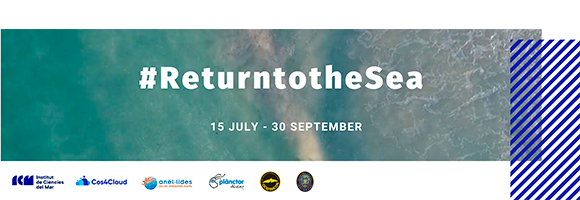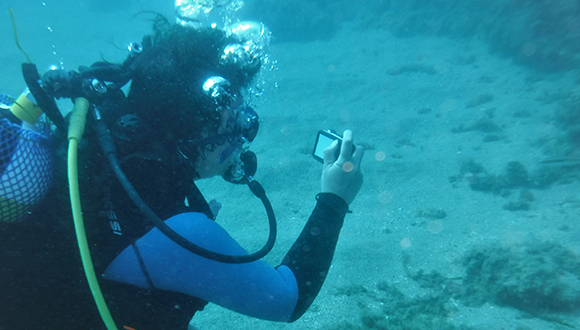Discover the biodiversity of the coast with the 'Return to the Sea' campaign
The Institute of Marine Sciences (ICM-CSIC), the Cos4Cloud project in which CREAF participates, the marine environmental services company Anèl·lides – Serveis ambientals marins, the environmental association Xatrac and three diving centres, Oceanicos, Escafandra Calafell and Plàncton diving have joined forces to promote the ‘Return to the Sea’ campaign, a citizen science initiative which seeks to collect the maximum number of observations of marine biodiversity on the Catalan coastline in July, August and September.
‘Return to the Sea’ is encouraging citizens to (re)connect with nature after all these months at home, to discover a wide variety of marine species and to share it with others. Furthermore, the observations collected on the beaches of Badalona, Barcelona and the Maresme will be able to be compared with the data from before the lockdown. ‘We suspect that thanks to these months with a lack of activity in maritime areas, some marine species may have ventured into shallower areas of the sea, and this campaign is a chance to check this’, says Andrea Comaposada, biologist and founder of Anè·lides– Serveis ambientals marins.

Anyone can participate in the initiative. All you have to do is take out your camera or mobile phone, look for living beings in the marine ecosystem, either underwater or near the beach, take a picture of them and post it in the ‘Return to the Sea’ project, available on the Natusfera citizen science platform. Once the photos have been posted, a network of experts and naturalists will help identify and validate the observations. The project will be open from 15 July to 30 September.
‘Return to the Sea’ is encouraging citizens to (re)connect with nature after all these months at home, to discover a wide variety of marine species and to share it with others.
The lockdown effect on the sea
For the time being, no one knows whether the participants will find greater biodiversity in shallower waters because of the lockdown, since there is not sufficient data and research into the impact of these last few months on nature requires more time.
Still, there may have been a change in distribution and behaviour of large organisms such as cetaceans, large fish and seabirds. Consequently, this may have affected the organisms they feed on and the chemistry of the water. Researcher Francesc Peters and his team at ICM-CSIC have started collecting data to find this out, and although the samples have not yet been analysed, according to Peters, "there may be some effect of this sort, although it will be difficult to verify”.

In addition, the campaign website is offering a guide showing some of the most common marine organisms on the Catalan coast. It was developed by Anèl·lides in conjunction with the Badalona City Council in the summer of 2019 to ascertain which species are spotted the most frequently on the Badalona beach, but it can be extrapolated to other zones. “The most special part of this guide is that all the photos are by people participating in Natusfera”, notes the founder of Anè·lides.
There may have been a change in distribution and behaviour of large organisms such as cetaceans, large fish andseabirds.
A valuable source of data
In addition to being a tool of learning, citizen science is used to get information which the entire scientific community can easily access. “It is a very economical way to get data on extensive areas. We want citizen science to become a part of research and decision-making with regard to environmental policies”, says Jaume Piera, the ICM-CSIC researcher associated with CREAF and the coordinator of the Cos4Cloud project.
The goal of the European Cos4Cloud project, one of the promoters of the campaign, is precisely to improve citizen science technologies to give it a more global reach. In fact, one of the services on which the project is working is MECODA, which Piera says “will enable all kinds of data to be visualised and compared much more easily, such as comparing the biodiversity data from before and after the lockdown”.







